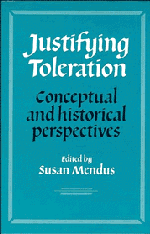Book contents
- Frontmatter
- Contents
- Preface
- Introduction
- 1 Scepticism and toleration in the seventeenth century
- 2 A more tolerant Hobbes?
- 3 Locke: toleration and the rationality of persecution
- 4 Toleration and Mill's liberty of thought and discussion
- 5 Rousseau and respect for others
- 6 The intolerable
- 7 Autonomy, toleration, and the harm principle
- 8 Friendship, truth, and politics: Hannah Arendt and toleration
- 9 Dissent, toleration, and civil rights in communism
- 10 Liberalism, marxism, and tolerance
- 11 Socialism and toleration
- Index
10 - Liberalism, marxism, and tolerance
Published online by Cambridge University Press: 20 May 2010
- Frontmatter
- Contents
- Preface
- Introduction
- 1 Scepticism and toleration in the seventeenth century
- 2 A more tolerant Hobbes?
- 3 Locke: toleration and the rationality of persecution
- 4 Toleration and Mill's liberty of thought and discussion
- 5 Rousseau and respect for others
- 6 The intolerable
- 7 Autonomy, toleration, and the harm principle
- 8 Friendship, truth, and politics: Hannah Arendt and toleration
- 9 Dissent, toleration, and civil rights in communism
- 10 Liberalism, marxism, and tolerance
- 11 Socialism and toleration
- Index
Summary
A Soviet broadcaster once explained the official policy on the content of radio programmes:
Absolute freedom is an invention of lovers of bombastic phraseology. Freedom of individuality is only permissible within a definite framework, not detrimental of society‥. That's why in providing broad vistas for the flight of creative fantasy we do not permit propaganda of violence, we ban pornography, we do not approve of works that contradict moral principles and negate values common to humanity.’
It is an argument which typically finds no favour with liberals, not least because the official policy seems to express intolerance for any view which does not accord with those laid down by the state. Soviet claims upon the word ‘toleration’ are seen, by the liberal, as a cynical exercise in redefinition: the Soviet state tolerates only that which it approves. But is the gap between the two views as wide as it sometimes seems? This is the question to which this chapter is directed.
Tolerance is most commonly referred to as a liberal value. It is held to epitomise the liberal's concern for freedom of speech and action, for free choice and intellectual scepticism. Marxism seems almost to confirm this link between liberalism and tolerance by the disdain it expresses for the institutions and assumptions which enshrine liberal values. As Merleau-Ponty once wrote: ‘To tell the truth and to act out of conscience are nothing but alibis of a false morality, true morality is not concerned with what we think or what we want.’
- Type
- Chapter
- Information
- Justifying TolerationConceptual and Historical Perspectives, pp. 223 - 236Publisher: Cambridge University PressPrint publication year: 1988
- 1
- Cited by



